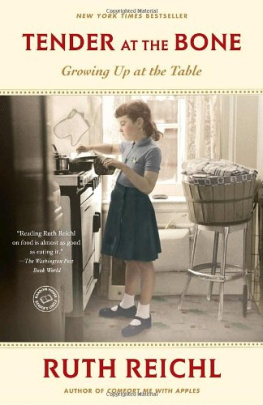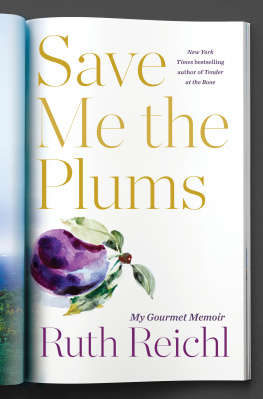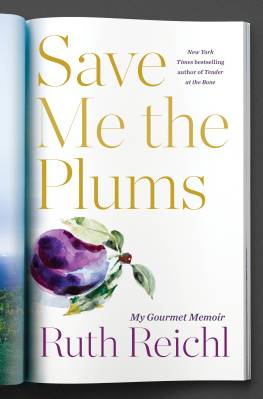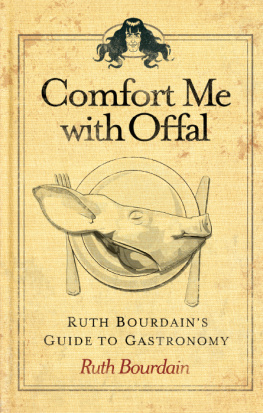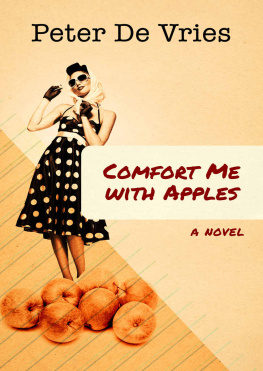Ruth Reichl - Comfort Me with Apples: More Adventures at the Table
Here you can read online Ruth Reichl - Comfort Me with Apples: More Adventures at the Table full text of the book (entire story) in english for free. Download pdf and epub, get meaning, cover and reviews about this ebook. year: 2010, publisher: Random House Trade Paperbacks, genre: Art. Description of the work, (preface) as well as reviews are available. Best literature library LitArk.com created for fans of good reading and offers a wide selection of genres:
Romance novel
Science fiction
Adventure
Detective
Science
History
Home and family
Prose
Art
Politics
Computer
Non-fiction
Religion
Business
Children
Humor
Choose a favorite category and find really read worthwhile books. Enjoy immersion in the world of imagination, feel the emotions of the characters or learn something new for yourself, make an fascinating discovery.

- Book:Comfort Me with Apples: More Adventures at the Table
- Author:
- Publisher:Random House Trade Paperbacks
- Genre:
- Year:2010
- Rating:3 / 5
- Favourites:Add to favourites
- Your mark:
- 60
- 1
- 2
- 3
- 4
- 5
Comfort Me with Apples: More Adventures at the Table: summary, description and annotation
We offer to read an annotation, description, summary or preface (depends on what the author of the book "Comfort Me with Apples: More Adventures at the Table" wrote himself). If you haven't found the necessary information about the book — write in the comments, we will try to find it.
Comfort Me with Apples: More Adventures at the Table — read online for free the complete book (whole text) full work
Below is the text of the book, divided by pages. System saving the place of the last page read, allows you to conveniently read the book "Comfort Me with Apples: More Adventures at the Table" online for free, without having to search again every time where you left off. Put a bookmark, and you can go to the page where you finished reading at any time.
Font size:
Interval:
Bookmark:
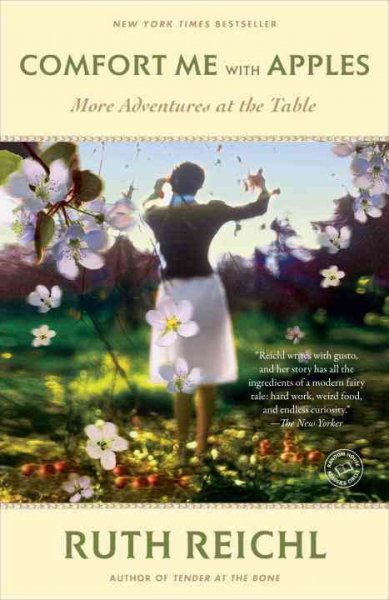
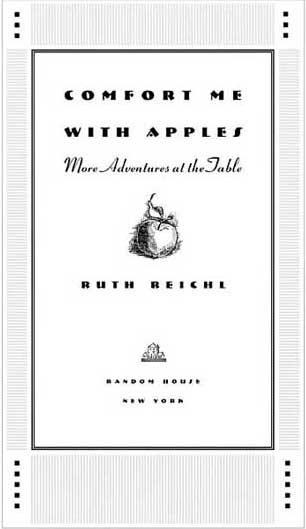
CONTENTS
This ones for Nick
THE OTHER SIDE OF THE BRIDGE
The primary requisite for writing well
about food is a good appetite.
A. J. LIEBLING
 Easy for him to say: He was independently wealthy. Personally, I found the primary requisite for writing about food to be a credit card.
Easy for him to say: He was independently wealthy. Personally, I found the primary requisite for writing about food to be a credit card.
And that was a problem. I pictured myself sweeping into fabulous restaurants to dine upon caviar and champagne. Matre ds would cower before the great Restaurant Critic. Chefs would stand behind the kitchen door, trembling. What is she saying? they would whisper to my waiter. Does she like it? I would not betray, by word or gesture, my opinion of the meal. And when it was all over, I would throw down my card and cry Charge it please!, then gather my retinue and float regally out the door.
Unfortunately, the first time I tried this I hit a few snags.
In 1978, San Franciscos fanciest French restaurant belonged to a chef who had cooked for the Kennedys. The valet stared at my beat-up Volvo and shook his head. He could not, he insisted, accept a car that used a screwdriver in place of a key. The matre dhtel was equally overjoyed by my arrival; he looked me up and down, took in my thrift-store clothing, and led me straight to the worst table, the one that shook each time a waiter came out the kitchen door. The sommelier appeared worried when I ordered the 61 Lascombes. He had, he was sorry to inform me, sold the last bottle. He was certain that a nice little Beaujolais would make me very happy. And when the captain announced that the special of the evening was freshly made terrine de foie gras, he pointedly told me the price.
The biggest humiliation, however, was yet to come. Your credit card, madam, said the matre dhtel frostily, has been rejected. He stood over me looking more smug than sorrowful; clearly he had been expecting this all along.
It couldnt be! I insisted. I just got it yesterday.
It says, madam, the matre dhtel went on, that you are over your limit. He leaned down and hissed menacingly. Do you know what your limit is?
Unfortunately, I did. After years of righteous poverty I was prepared to sacrifice my principles and leap back into middle-class life. The middle class, however, had its doubts about me. Although I was now a bona fide restaurant critic, the banks were not impressed. Where, they wanted to know, were my debts? How had I managed to live thirty years without owing anything to anyone? Were there no college loans, no car payments, no mortgages, no revolving lines of credit? How could I possibly be trusted with a credit card?
In desperation I had put on my very best dress and arranged for an appointment with the bank manager. After making me wait a suitable length of time, he graciously permitted me to show him the masthead of New West magazine. I was hoping that my association with New York magazines West Coast sibling would impress this man, that he would recognize it as Northern Californias most important regional publication. But the manager merely looked bored. As he unhurriedly put on his half-glasses, I wished that I had tamed my hair out of its usual wildness. I patted, vainly, at it and tried pulling the most excitable curls behind my ears. They popped willfully forward. He snorted.
He scanned the list of contributing editors. He noted my name. He grunted. Meaningless, he said at last. What we are looking for is something to show that you will pay your bills. Can you show me a pay stub?
Im freelance, I stammered. I dont get a paycheck. They pay me by the article.
He drew visibly back from me. He looked sorrowful. Unreliable, he sighed at last, staring at my ringless fingers. It says here, he said, peering skeptically at the papers in his hand, that you are married? To a Mr. Douglas Hollis? The tone of his voice implied that he wondered what someone who looked like me might be doing with someone who sounded like that.
Yes, I replied. I am.
And what does Mr. Hollis do for a living? he inquired. His income does not seem to be represented here. I considered giving him my feminist line, but one look at his sour face decided me against it.
Hes an artist, I said. He does site sculpture. He actually hasnt had much income in the past couple of years, but thats about to change
I understand, he said firmly, and made a mark on the paper. Despite his name, Mr. Hollis was clearly no more trustworthy than myself.
After months of pleading, the bank was finally persuaded to part with a Visa card. If I proved conscientious and faithful in my payments, the manager suggested, I might, in due time, be permitted a bit more credit. We would have to see. In the meantime, he was prepared to go out on a $250 limb.
It was not enough. I was not surprised. I had known from the start that this job would be trouble. I had been writing short magazine articles for a couple of years, but nobody I knew took them seriously. They were considered, like my restaurant job, just a sideline to support my real work as a novelist. Fixing the money part turned out to be easy; I wrote the fancy French restaurant a check and asked my editor for an advance. The rest would be more complicated.
On the day I became a restaurant critic, my primary emotion was fear. As I drove home from the magazine, I practiced breaking the news to the people I loved best. I found the prospect so terrifying that I forgot to be frightened of the bridge and I reached the far side of the Bay before realizing that I had crossed the entire span without my usual panic. I turned off the freeway, and as my ancient car bumped through the Berkeley flatlands, past the small old cottages with their softly fading paint, I tried to find the perfect way to put it.
Ive just gotten the best job in the world! As I heard myself say the words, I knew they wouldnt do. They would be fine in San Francisco or New York, but this was the Peoples Republic of Berkeley. This was the heart of the counterculture. Every single person I knew was going to disapprove.
I walked into the hallway of the peeling Victorian house I shared with my husband and five other people and waited for their reactions.
Nick, our household patriarch, was sitting in the shabby, crowded living room. He stroked the bushy beard that gave him the air of a prophet and said, Let me get this straight. He plunked himself into one of the tattered armchairs we had found at the flea market and began pushing the stuffing back into the arm. Youre going to spend your life telling spoiled, rich people where to eat too much obscene food?
Something like that, I murmured, too embarrassed to defend myself.
He shook his head in disappointment. A devotee of millet and Dr. Bronners balanced mineral bouillon, Nick had done his Berkeley best to turn our household into a model of politically correct consumption. We had, at various times, been ovolactovegetarians and vegans, and we were, at all times, vigilant about the excesses of agribusiness. For a long while we grew our own food, and we even, for a short while, depended upon dumpsters for our raw ingredients. Nick had valiantly tried to overlook my forays into the world of fancy food, but this was going too far. For the first time in the many years I had known him, he became speechless.
Jules, the most sympathetic member of our household, tried to be optimistic. He poured himself a glass of wine from the gallon jug on the table and said, Free meals! He turned to Nick and said, Think how our food bills will go down.
Next pageFont size:
Interval:
Bookmark:
Similar books «Comfort Me with Apples: More Adventures at the Table»
Look at similar books to Comfort Me with Apples: More Adventures at the Table. We have selected literature similar in name and meaning in the hope of providing readers with more options to find new, interesting, not yet read works.
Discussion, reviews of the book Comfort Me with Apples: More Adventures at the Table and just readers' own opinions. Leave your comments, write what you think about the work, its meaning or the main characters. Specify what exactly you liked and what you didn't like, and why you think so.

